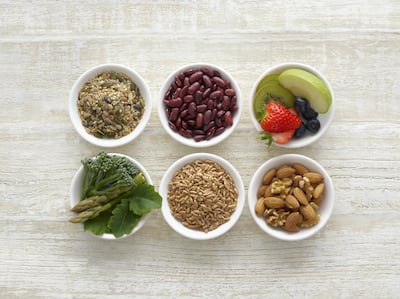For decades it was believed that animal protein was the key to top athletic performance and a strong and healthy body. However, there is now a growing movement of athletes willing to prove otherwise.
Joanne Owen, dragon boat racer
Joanne Owen, 47, is one of them. The British expatriate, who has been a vegan for more than two years, won bronze with her team, Dragonfire Dubai, in the dragon boat world championships in Hungary this year. “I knew I had to make some major changes in order to overcome decades of migraines, fluctuating weight, asthma, muscle soreness, palpitations, water retention and fatigue,” she says. “For years I treated each symptom separately with pills, supplements, anything that worked at the time. I was diagnosed with literally everything from depression and infertility to asthma and thyroid issues. The verdict from my doctor: take several pills daily for the rest of my life. This is when I realised there must be a better way.”
Since Owen's journey down a plant-based path began, the changes to her health have been huge. “I no longer have migraines on a regular basis, rarely have an issue with asthma, and have got rid of my thyroid condition, but most importantly I have heaps more energy than I did 15 years ago,” she says. The benefits this has had on Owen’s athletic performance are undoubtable, too. During the championship training, she had to cut weight to stay light and sometimes train up to three times a day, but she says: “I worked alongside my omnivore teammates on the same rigorous regime with no dips in energy, endurance or power at all.” Owens says she eats a diet rich in fresh vegetables, fruits, beans, pulses, nuts and seeds. "It's also possible to 'cheat' on a vegan diet, with meatless burgers, hot dogs and pizza," she adds.

Kevin Bradford, triathlete
Dubai’s Kevin Bradford is another athlete who found that a vegan diet works wonders for his triathlon training regime. He was sceptical at first, he admits. “I assumed it would lead to a performance drop and I was looking to disprove that it was possible to perform consistently on a plant-based diet.” In fact, it did the reverse.
“I find that a plant-based diet complements my training perfectly. I don’t calorie count and just eat as many fresh and whole foods as I want. If I am hungry, I eat until I am full. It’s simple. I manage to maintain a consistent body weight – within one or two kilos – which rarely changes, and which is crucial particularly for anyone taking part in endurance sports and especially cycling.” Not only has the diet enhanced Bradford's performance, but he says his health has also improved. “I very rarely get sick unless I am really pushing it in my training cycle, or in a tough race in extreme hot or cold conditions. My digestion is hugely improved due to a higher intake of fibre.”
Physical changes, such as weight loss, came alongside the shift, with Bradford’s body letting go of stubborn fatty deposits that he had “held on to for years”, even with training for ultra-distance events and running 70 kilometres or more a week. He says it is time to help break the myth of the body’s need for large amounts of protein. “The biggest myth out there is that you have to consume specific protein-heavy products to support muscle repair and growth,” he says. “As a rule of thumb, I would recommend 1 gram of protein per 1kg of body weight. That is not much at all when you consider that 100g of cashew nuts is 18g of protein. It is practically impossible to become protein-deficient when eating an adequate amount of food on a plant-based diet.”
He adds that the key is for people to educate themselves about what they eat, and to understand food labels and know where their food comes from, as well as what it contains, not least, meat. “Once you peel back the layers behind the products you consume, you may be shocked at what you find,” he says.
_________________________
Read more:
[ UAE vegans share their recommendations on popular meat alternatives ]
[ Why you don't have to give up baked goods when becoming a vegan ]
[ Heather Mills: My kid is vegan and never sick ]
_________________________
Walter Penaloza, marathon runner
Runner Walter Penaloza, 35, competed in the Oman Trifecta last weekend [Dec14-15], doing 5km, 15km and 25km Spartan obstacle races over two days. The Ecuadorean says: “When I was a meat-eater, I finished a half marathon in four hours and 30 minutes and was sore for days. Recently, I managed a full marathon in four hours and 50 minutes and on the next day, I went for a 15km run in the morning and a 5km run in the afternoon.”
The full-time banker has been vegan for two years. “Before I always felt tired, heavy and sluggish. After going vegan, the effects were immediate and remarkable. My energy levels are very high, I feel a lot lighter and more peaceful. I also feel that my recovery and performance are improving every day.”
Penaloza says of his top ingredients: "Beans, especially black beans, are a good source of protein, and so are nuts. Many runners often carry a bag of nuts with them at all times. Leafy green vegetables, such as kale, broccoli and spinach, transform the Sun's energy into edible energy, which is useful for athletes. And finally I would recommend celery, as it strengthens the ligaments."

The protein myth
Dr T Colin Campbell, a professor at Cornell University and a pioneer of the plant-based movement, has written extensively on the myths surrounding protein consumption. He says that the current belief that our daily diets need to include 35 per cent of protein is a gross overestimate. “Promoting 35 per cent protein as an acceptable level… is a disaster. In fact, a wholefood, plant-based diet, with no added oil, can easily provide 10 per cent to 12 per cent total protein, which meets the long-established recommended daily allowance of 9 per cent to 10 per cent. The continued use of an upper ‘safe’ level of 35 per cent protein is, in my view, unscientific and completely irresponsible.”
United States-certified dietitian and nutritionist Farah Hillou agrees, and says diet does not follow a one-size-suits-all formula. “What’s good for me, isn’t necessarily good for you,” the UAE-based Canadian says. “The most important thing is choosing wisely by buying organic and chemical-free foods rather than processed foods, and prioritising quality over quantity.”
Hillou acknowledges that veganism is not for everyone, and that a vegan diet can still be unhealthy if it’s full of sugar or gluten. However, she says meat consumption has become a veritable minefield. “The quality of the meat we are eating now is not great, so we need to reduce our consumption and focus on good-quality, grass-fed, organic meats. Processed meat is really unhealthy, but it’s become part of people’s staple diet, part of lunch boxes, and it’s this we really need to cut out.”






